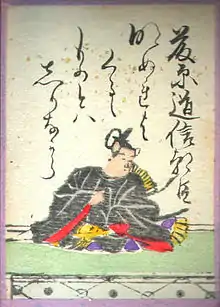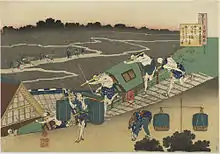Fujiwara no Michinobu
Fujiwara no Michinobu (藤原道信, 972–994) was a Japanese waka poet of the mid-Heian period. One of his poems was included in the Ogura Hyakunin Isshu. He produced a private waka collection, the Michinobu-shū.

Fujiwara no Michinobu, from the Ogura Hyakunin Isshu.
Biography

Katsushika Hokusai, The Poem of Fujiwara no Michinobu Ason, 1839, Princeton University Art Museum, depicting the poem transcribed in the cartouche at upper right:
Though I know full well
That the night will come again,
E'en when day has dawned;
Yet, in truth, I hate the sight,
Of the morning's coming light.
Though I know full well
That the night will come again,
E'en when day has dawned;
Yet, in truth, I hate the sight,
Of the morning's coming light.
Born in 972, he was a son of Tamemitsu and adopted by the latter's brother Kaneie.[1][2]
He served as commander of the guard, and although he died young he was considered a brilliant commander.[1] He died in 994.[1][2]
Poetry
Forty-eight of his poems were included in imperial anthologies, and he was listed as one of the Late Classical Thirty-Six Immortals of Poetry.[1][2]
The following poem by him was included as No. 52 in Fujiwara no Teika's Ogura Hyakunin Isshu:
| Japanese text[3] | Romanized Japanese[4] | English translation[5] |
|
|
|
A private collection of his poems, the Michinobu-shū (道信集), survives.[1][2]
References
- McMillan 2010 : 141.
- Daijirin entry "Fujiwara no Michinobu". Sanseidō.
- Suzuki et al. 2009 : 67.
- McMillan 2010 : 165.
- McMillan 2010 : 54.
Bibliography
- Keene, Donald (1999). A History of Japanese Literature, Vol. 1: Seeds in the Heart — Japanese Literature from Earliest Times to the Late Sixteenth Century. New York: Columbia University Press. ISBN 978-0-231-11441-7.
- McMillan, Peter. 2010 (1st ed. 2008). One Hundred Poets, One Poem Each. New York: Columbia University Press.
- Suzuki Hideo, Yamaguchi Shin'ichi, Yoda Yasushi. 2009 (1st ed. 1997). Genshoku: Ogura Hyakunin Isshu. Tokyo: Bun'eidō.
External links
- List of Michinobu's poems in the International Research Center for Japanese Studies's online waka database.
- Fujiwara no Michinobu on Kotobank.
This article is issued from Wikipedia. The text is licensed under Creative Commons - Attribution - Sharealike. Additional terms may apply for the media files.